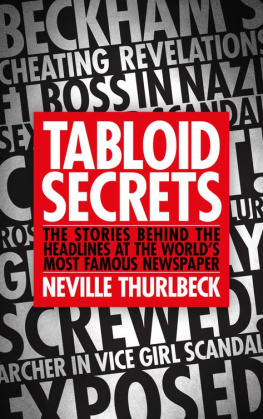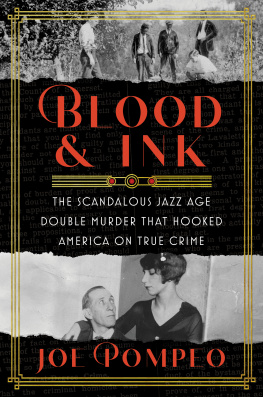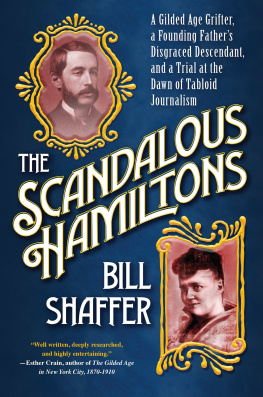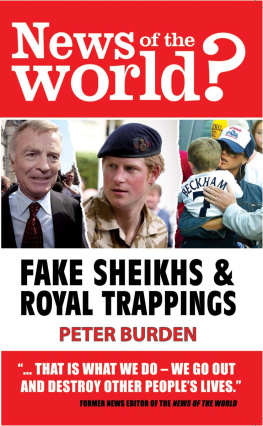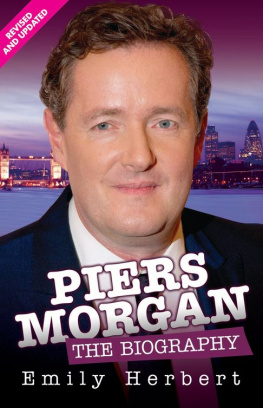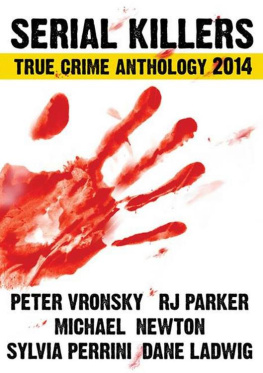I N PENNING THIS little memoir, I have tried to give a flavour of what life was like working for Fleet Street tabloids during the 1980s, 90s and up to the closure of the News of the World in 2011.
Since then, there has a been whole sea change in the way the tabloids report their news and the types of stories they cover. The Leveson Inquiry, numerous police investigations and a torrent of criticism (to put it mildly) from outraged celebrities and politicians have seen to that, for better or for worse.
But for a quarter of a century, I helped the red-top newspapers dole out their daily fare of scandals and exposs with cavalier abandon. And the British public bought into it in their millions.
It is a world that has vanished for good. And it is an insight into this very bizarre career which I thought you might be interested in seeing, through the eyes of a man who spent his life there. I hope you find it an entertaining read.
If none of you read it, it will at least provide future generations of my family with a lasting monument to the absurd and bonkers world of their bizarre ancestor!
Those of you looking for an insight into the phone-hacking saga will be disappointed. I think most of you will now be fed up to the back teeth with the wall-to-wall coverage of it over the past several years. And I dont want this book to be boring, self-serving guff. And I have no wish to heap piles of blame on anyone, many of whom are suffering greatly as I write. Finally, to focus on phone-hacking would distort the narrative, as it came onto my radar less than a handful of times in twenty-five years. That it came onto my radar at all is, of course, extremely regrettable and I apologise to anyone affected by it.
You will also hear very little of my wife and children, as I dont want them to become part of this story, although they are a large part of my normal life.
While I covered hundreds of stories for the News of the World, the Today newspaper and the Daily Mirror, I have picked out a dozen or so which I hope give a flavour of how we worked in those ruthless, cut-throat times.
For a young man, they were an adventure. One minute, you could find yourself in the middle of an Alfred Hitchcock thriller. Next, a Marx Brothers comedy. Another, a Jacobean tragedy. It was never dull and I hope this book is a fair reflection of the industry I now look back on with fondness and astonishment.
T HE EXPRESSION GENTEEL poverty could have been invented to describe my family. I was born in the front bedroom of 33 Merle Terrace, Sunderland, in what was then Co. Durham, on 7 October 1961.
It was just after breakfast, so as the midwife held me up to slap my bottom, my first view from the Victorian sash window would have been of thousands of men marching to work in the shipyards. Their tightly belted raincoats, flat caps and old gas mask haversacks slung over their shoulders carrying their lunchtime bait was a daily sight in that town, which prided itself on its heavy industrial heritage. Some of the older men still wore hobnailed boots, striking the occasional spark which played on the cobbles at dusk.
We lived on the main road, which was just a five-minute walk downhill to the world-famous Doxford shipyard. Together with Laings, Thompsons, Clarkes, Shorts, Austins, Bartrams and the Corporation Yard, they produced a quarter of the nations shipping during the Second World War, an impressive 1.5 million tons. Sunderland was by then the biggest shipbuilding town in the world, and ships and engineering were fixed in my familys DNA.
My maternal grandfather, Jack Tunstall, worked at Doxfords as an engineer. On my fathers side, the Thurl family had arrived as Viking invaders and established a settlement near the source of the river Wear. Bekkr is Old Norse for stream or brook and the name gradually morphed into Thurlbeck. And there we remained for the best part of a millennium.
For most of the nineteenth century and into the early twentieth, the Thurlbecks were river pilots. Their task was to board large ships coming into port and carefully navigate them around the dangerous sandbanks at the mouth of the river Wear, and the jobs were passed from fathers to sons.
The landscape and lifestyle into which I was born will seem to some like another world but was the norm in post-war northern England. We had an outside lavatory, no telephone and no car. And we never went abroad. In my family, anywhere outside England was simply classed as abroad. It was dismissed as a place of no consequence Why would we want to go abroad for? So our holidays were taken in Devon, the Lake District or at my aunt and uncles home in the Buckinghamshire countryside. And for something a little more exotic, Wales or Scotland, with my mother cheering, Look, were crossing the border now! as we all clapped and wondered at the sheer vastness of our journey in our 1960 Ford Classic.
The holidays at my aunt Margaret and uncle Warrens in the 1960s and early 70s were idyllic and provide me today with my happiest childhood memories. I am still incredibly close to them. At their little cottage in a peaceful, pretty little village, I had my first glimpse of another type of England, completely different to the one Id been brought up in. Fields of barley sprouted from pleasingly rounded and evenly eroded hillocks of chalk. The average Buckinghamshire man and woman still spoke with a distinctive, slightly West Country burr, now long since vanished. And the elongated summers seemed to turn everyone an attractive light tan, rather than the sallow hue of the average Wearsider, who lived beneath slate-grey skies.
My uncle Warren was and still is full of mischievous, schoolboy charm; my aunt Margaret my mothers cousin one of the most enchanting and elegant ladies Ive ever met. To be with them was huge fun. And, together with my parents, I saw the picture-postcard Bucks countryside with its church-steepled villages. There were trips along the Thames on riverboats, Disraelis house at Hughenden, biplanes at Old Warden aerodrome and a fabulous toy shop in Old Beaconsfield, where I once saw the actress Dame Margaret Rutherford in 1969, giving me my first glimpse of a celebrity.
There would be day trips to London, too. There were two highly exotic areas of London that really captured my imagination. Shaftesbury Avenue with its theatres cheek by jowl and the names of the great and the good up in lights Ralph Richardson and John Gielgud in No Mans Land, Donald Sinden and Frank Thornton in Shut Your Eyes and Think of England and John Quayle and Penelope Keith in Donkeys Years. This was my first taste of proper theatre. Id scour the listings pages of the Sunday Times to see if I could spot anyone famous appearing in the West End and off wed all go, via the Tube from Amersham, to the Globe or Wyndhams. From the age of around ten, I was mesmerised by the magical world beyond the proscenium arch, and the passion has never left me.
The second area of intrigue to me was Fleet Street. In 1968, it was the epicentre of the biggest and best newspaper operation in the world. I recall being taken aback that the newspaper offices were all so close together, and have a vivid memory of my uncle taking us there, simply to look at the buildings. During one of our London visits, he paid the taxi driver five shillings as we stepped out in front of the Daily Expresss art deco office just a few seconds walk from the Daily Telegraph, resplendent with its masthead, which conveyed gravitas and importance. Around the corner, in Bouverie Street, the jaunty, almost Wild West-style lettering of the

